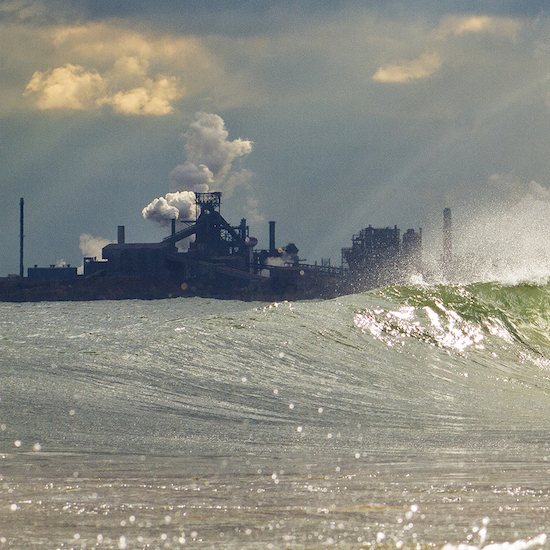
09 • 23 • 2022
Hold U.S. Steel Accountable for Polluting Lake Michigan
Goal achieved: To hold U.S. Steel accountable for illegal discharges into Lake Michigan and prevent future illegal discharges, to improve water quality and protect public health.
In April 2017, U.S. Steel illegally discharged around 350 pounds of chromium – nearly 300 pounds of which were highly toxic and carcinogenic hexavalent chromium, made famous in the movie Erin Brockovich — into a small waterway that feeds directly into Lake Michigan. This massive and dangerous discharge next door to the Portage Lakefront and Riverwalk, and a mere eight miles from the Indiana Dunes National Lakeshore, ultimately shut down public beaches from Gary to Michigan City for six days, closed public drinking water intakes, and endangered aquatic life.
Even before the April incident surfers, including some Surfrider members who enjoy the Portage Lakefront, were some of the first to raise concerns about the steel plant next door. They were alarmed by the unseasonably bathwater-like temperatures near the U.S. Steel plant. Wanting to know more about the water they spent so much time in, Surfrider began to look into water quality along Northwest Indiana beaches, working with lawyers and students from the Abrams Environmental Law Clinic at the University of Chicago Law School. When news of the spill broke on April 11, that work took on a new level of urgency.
Surfrider and the Clinic found that high temperatures and the hexavalent chromium spill were just a few links in a larger chain of other chemical spills, inadequate monitoring and reporting, and shoddy maintenance. News reports from the past several years detail how U.S. Steel has delayed needed plant upgrades and laid off necessary maintenance workers in a deliberate strategy of cost-cutting at the expense of worker safety and the health of lakefront ecosystems. Through years of violations and poor maintenance, regulators at the state and federal levels took no meaningful action.
In the interest of our Chicago Chapter, Surfrider Foundation filed suit against U.S. Steel and intervened in a lawsuit filed by the U.S. and State of Indiana against U.S. Steel to ensure that the Clean Water Act violations would be addressed. The governments' lawsuit against U.S. Steel resulted in a consent decree that outlined actions U.S. Steel would be required to take to improve its operations and prevent future violations.
While the modified, approved consent decree still has shortcomings, Surfrider’s citizen suit started the process leading up to the governments’ lawsuit, and Surfrider’s involvement as an intervenor in that suit, along with the City of Chicago, resulted in meaningful improvements to the outcomes achieved. U.S. Steel ultimately agreed to implement a local environmentally beneficial water quality monitoring project for the community negatively impacted by its pollution for three years, which includes several shore locations along Lake Michigan, including near the Midwest Plant and Indiana National Dunes Park, which is affected by U.S. Steel’s water quality violations. Specifically, the project requires testing at seven locations, on a monthly basis between October 1 and April 30, and a weekly or twice-weekly basis for particular locations between May 1 and September 30. U.S. Steel is required to use a certified third party for all sampling and reporting. Public sampling reports must be made publicly available at https://midwest.uss.com, and U.S. Steel is required to input all results for E. coli into the BeachAlert notification system at https://portal.idem.in.gov/BeachAlert/. U.S. Steel is also required to provide EPA and IDEM with the raw lab data for chromium, hexavalent chromium, and E. coli within eight hours of obtaining a test result from the lab. U.S. Steel also ultimately agreed to improved public notification requirements in the event of a future spill or release to ground, soil or water, in addition to other applicable legal notification requirements.
